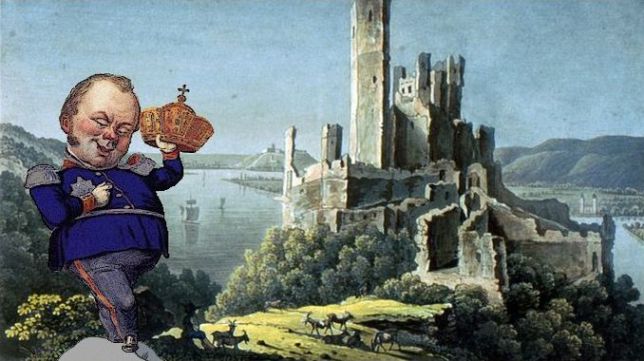
After the Congress of Vienna, the Rhinelanders became Prussian Rhineland citizens, subjects of the Prussian kings and emperors in Berlin. The Prussians on the Rhine? What business did they have here?
Well, their King Frederick William III may have asked himself the same question when the Congress of Vienna in 1814/1815 granted him the Rhineland and Westphalia. Yet, the Kingdom of Prussia saved our Drachenfels.
Prussian Rhine Province
The following decades were a time of cultural splendor, but also a time of political oppression. The industrial revolution led to an economic upswing, but also to social hardships and pauperization. Despite the hardest work, many people were no longer able to earn a living for themselves and their families. King Frederick William IV in Potsdam’s Sanssouci Park didn’t care.
Revolution 1848/49
The great social need and pent-up anger against the restoration policy finally erupted in the March revolution. Frederick William IV formed a cabinet with the Rhineland liberals Ludolf Camphausen and David Hansemann – now a bourgeois from the Rhine Province was heading the Prussian cabinet! In Bonn, the democrats’ hopes rested on Professor Gottfried Kinkel and his student Carl Schurz. But the revolution failed.
Bismarck era
Germany was united, and a deeply felt wish of many people had been fulfilled. However, 10 million Austrian Germans lived outside the Empire, and now Prussia’s dominance was overwhelming, with Bismarck being the outstanding “iron chancellor”.
Belle Époque is the name given to these approximately 30 years around the turn of the 19th and 20th centuries in Europe. In the Siebengebirge, the rack railways and Drachenburg Castle were built. Finally, the Cologne Cathedral was also completed.
Wilhelmine Germany
Wilhelmine Germany was a modern industry state, a “High-Tech location” as we would say today, but also a conservative authoritarian state. As one of the world’s leading economic powers, Germany wanted “her place in the sun”. But the political situation in the world was tense, with European powers competing over colonies.
In our region, the Grand Hotels were built along the Rhine promenade and on top of Mount Petersberg. At the same time, the extensive quarries in the Siebengebirge almost destroyed them.
But Wilhelm’s “glorious times” ended in death and destruction.
Carl Schurz, the German American
Rhineland’s history is also a bit German and European history. During the last 2,000 years, people of numerous nationalities have come to the Rhine. Similarly, there are Rhinelanders who fled political or religious persecution and built up a new life in America. One of them was Carl Schurz.
German revolutionary
“Before I left the house I went for a moment to my study. From the window I had a free outlook on the Rhine and the lovely Seven Mountains. How often, gazing upon this charming picture, had I dreamed of a quiet and beautiful life! Now I could in the darkness distinguish only the outline of my beloved hills against the horizon. Here was my room quiet as ever. How often had I peopled it with my imaginings! Here were my books and manuscripts, all testifying of hopes, plans, and endeavors, which now perhaps had to be left behind forever. An instinctive feeling told me that all this was now over.”
Carl Schurz, Reminiscences, Volume 1
It was the evening of May 10, 1849, in Bonn. The young Carl Schurz, a student at Bonn University, said good-bye to his family and his home. That night, he set out to join the revolutionary democratic forces in a desperate attempt to save the achievements of the revolution 1848/49.
We know they failed. Schurz barely escaped alive and had to emigrate. His first station was London, here he married Margarethe. Some years later, in 1852, they emigrated to the United States. During the following years, Schurz became an important politician, and almost a friend to President Abraham Lincoln.
American Statesman
Schurz loved his new homeland. Here all that he had fought for back then in Germany should become reality. He was elected to the US Senate from Missouri, and in 1977 President Hayes appointed him Secretary of the Interior. Back then, the Lincoln County War and the Indian Wars raged in the Wild West.
President Hayes did not run for re-election, so Schurz returned to journalism and writing, and he moved to New York. He remained a strong fighter for honest government and encouraged reform-minded Republicans until his death in 1907.
Kingdom of Prussia and German Reich
Intro Prussian Rhineland | Prussian Rhine Province | Revolution 1848/49 | Bismarck Era | Wilhemine Era |

Be the first to comment